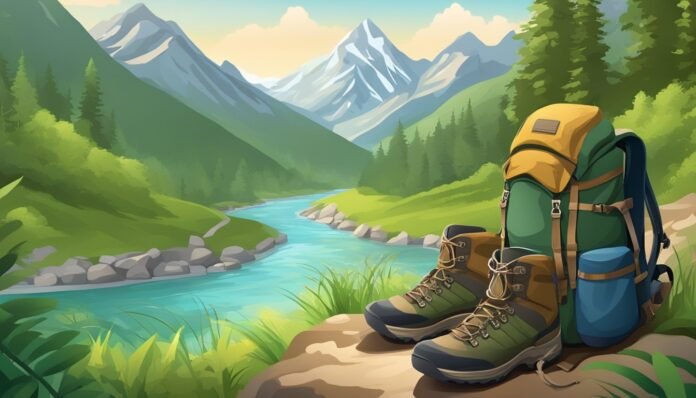If you’re looking for a way to escape the hustle and bustle of daily life and experience the great outdoors, backpacking may be the perfect activity for you. Backpacking is a great way to explore nature, get some exercise, and challenge yourself. However, if you’re new to backpacking, it can be intimidating to know where to start. This guide will provide you with all the information you need to plan and prepare for your first backpacking trip.
Before you begin planning your trip, it’s important to understand what backpacking is. Backpacking involves carrying all your gear in a backpack and hiking to your destination, where you’ll set up camp for the night. Backpacking trips can range from a few miles to hundreds of miles, and can last anywhere from a single night to several weeks. Backpacking is a great way to experience the wilderness and challenge yourself both physically and mentally, but it requires careful planning and preparation to ensure a safe and enjoyable trip.
If you’re new to backpacking, don’t worry – with some careful planning and preparation, you can have a successful and enjoyable trip. In this guide, we’ll cover everything you need to know to plan and prepare for your first backpacking trip, including choosing a destination, selecting the right gear, and packing your backpack. Whether you’re planning a short overnight trip or a longer multi-day trek, this guide will help you get started on your backpacking journey.
Getting Equipped: The Essentials for Backpacking
When it comes to backpacking, having the right gear is essential. You need to make sure you have everything you need to stay comfortable, safe, and nourished while out on the trail. Here are the essential items you’ll need to get started.
Choosing the Right Backpack
The most important piece of gear for any backpacker is, of course, the backpack. When choosing a backpack, you’ll want to look for one that is comfortable, durable, and the right size for your needs. A good rule of thumb is to choose a backpack that can hold about 25-30% of your body weight. Look for features like padded straps, a sturdy frame, and plenty of pockets for organization.
Selecting Your Sleeping System
Getting a good night’s sleep is crucial when backpacking, so you’ll want to make sure you have the right sleeping system. This typically includes a sleeping bag, sleeping pad, and tent. Look for a sleeping bag that is rated for the temperatures you’ll be encountering, and a sleeping pad that is comfortable and provides adequate insulation from the ground. When choosing a tent, consider factors like weight, durability, and ease of setup.
Packing the Tent and Shelter Essentials
Aside from the tent itself, there are a few other shelter essentials you’ll need to bring along. This includes a ground cloth to protect your tent from moisture and abrasions, stakes to secure your tent to the ground, and a rainfly to keep you dry in wet weather.
Backpacking Gear for Cooking and Nutrition
When it comes to cooking and nutrition, you’ll want to pack lightweight and easy-to-use gear. This typically includes a backpacking stove, cookware, and a water filter. Look for a stove that is compact and easy to light, and cookware that is lightweight and durable. A water filter is essential for ensuring you have access to clean drinking water while out on the trail.
Clothing and Footwear
When it comes to clothing and footwear, you’ll want to choose items that are comfortable, breathable, and appropriate for the weather conditions you’ll be encountering. This typically includes a base layer, mid-layer, and outer layer for your upper body, as well as pants or shorts and appropriate footwear. Look for materials that are moisture-wicking and quick-drying to help keep you comfortable while on the trail.
In summary, having the right gear is essential for any backpacking trip. By choosing the right backpack, sleeping system, shelter essentials, cooking and nutrition gear, and clothing and footwear, you’ll be well-equipped for a safe and enjoyable trip.
Planning and Preparation: Keys to a Successful Trip
Planning and preparation are crucial to having a successful backpacking trip. Before you hit the trail, it’s important to map out your route and itinerary, understand the weather and terrain, and ensure your safety, navigation, and Leave No Trace principles are in check.
Mapping Your Route and Itinerary
Mapping your route and itinerary is essential to a successful backpacking trip. You should research the area you plan to visit, including water sources, camping areas, and any permits or regulations you need to follow. You can use resources like AllTrails, guidebooks, and trail maps to help plan your route and create an itinerary.
Understanding Weather and Terrain
Understanding the weather and terrain is crucial to your safety and enjoyment on the trail. Check the weather forecast before you go and pack accordingly. Be prepared for changes in weather and bring layers to stay warm and dry. Additionally, research the terrain you will be hiking on and ensure you have the necessary skills and equipment, such as trekking poles, to navigate it safely.
Safety, Navigation, and Leave No Trace
Safety, navigation, and Leave No Trace principles are essential to protecting yourself and the environment. Before you hit the trail, ensure you have the necessary safety equipment, such as a first aid kit, and know how to use it. Navigation tools like a GPS and compass can help you navigate the trail, but it’s important to also know how to read a map and use landmarks. Finally, follow Leave No Trace principles to minimize your impact on the environment and preserve the natural beauty of the area for future generations.
In summary, planning and preparation are key to a successful backpacking trip. By mapping your route and itinerary, understanding the weather and terrain, and ensuring your safety, navigation, and Leave No Trace principles are in check, you can have a safe and enjoyable experience in nature.
Frequently Asked Questions
What essential items should I include in my backpacking checklist?
When planning your backpacking trip, it is important to pack only the essentials to keep your backpack as light as possible. Some of the essential items you should include in your backpacking checklist are a tent, sleeping bag, sleeping pad, cooking stove and fuel, water filter or purification tablets, headlamp or flashlight, first aid kit, and a map and compass.
How do I plan my first backpacking trip?
Planning your first backpacking trip can be overwhelming, but it is important to start with a simple itinerary. Choose a destination that is beginner-friendly and close to home. Research the trail, weather conditions, and any permits or fees required. Make a checklist of all the necessary equipment and supplies, and plan your meals and water sources accordingly.
What are some recommended destinations for beginner backpackers?
There are many beginner-friendly destinations for backpackers. Some of the popular options include Sawtooth Lake in Idaho, Cracker Lake in Glacier National Park, and Coyote Gulch in Grand Staircase Escalante. When choosing a destination, consider the difficulty level, distance, and elevation gain.
How can I estimate the budget required for a backpacking adventure?
The budget for a backpacking adventure can vary depending on the destination, duration, and equipment needed. Some of the expenses to consider include transportation, permits or fees, food and water, and equipment rental or purchase. Research the costs of each expense and make a budget accordingly.
What are the basic skills I need to learn before going backpacking?
Before going backpacking, it is important to learn basic wilderness skills such as map reading, navigation, first aid, and Leave No Trace principles. It is also important to know how to set up a tent, start a fire, and filter or purify water. Consider taking a wilderness skills course or practicing these skills before your trip.
How long should my initial backpacking trips be to gain experience?
For your initial backpacking trips, it is recommended to start with a 1-2 night trip covering half the mileage and elevation gain you would normally do on a day hike. This will allow you to gain experience and confidence before attempting longer and more challenging trips.

